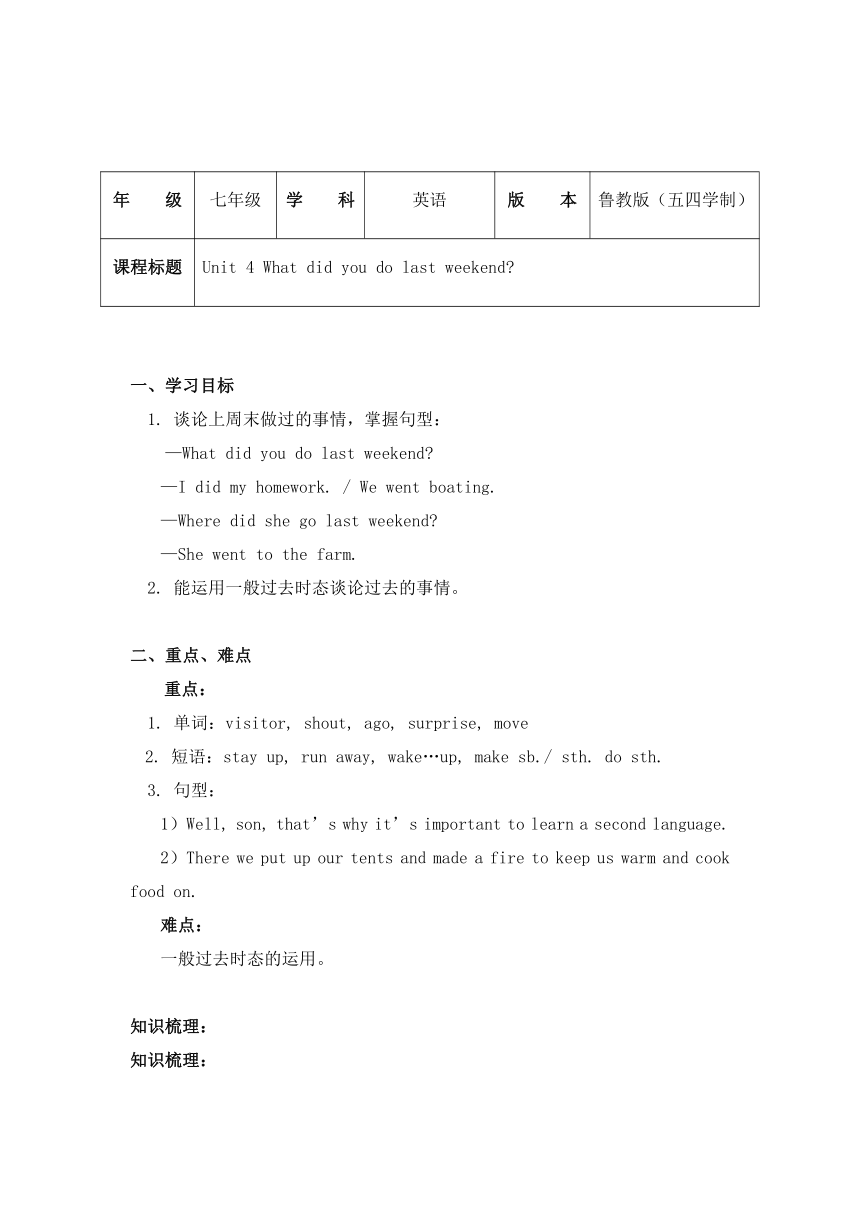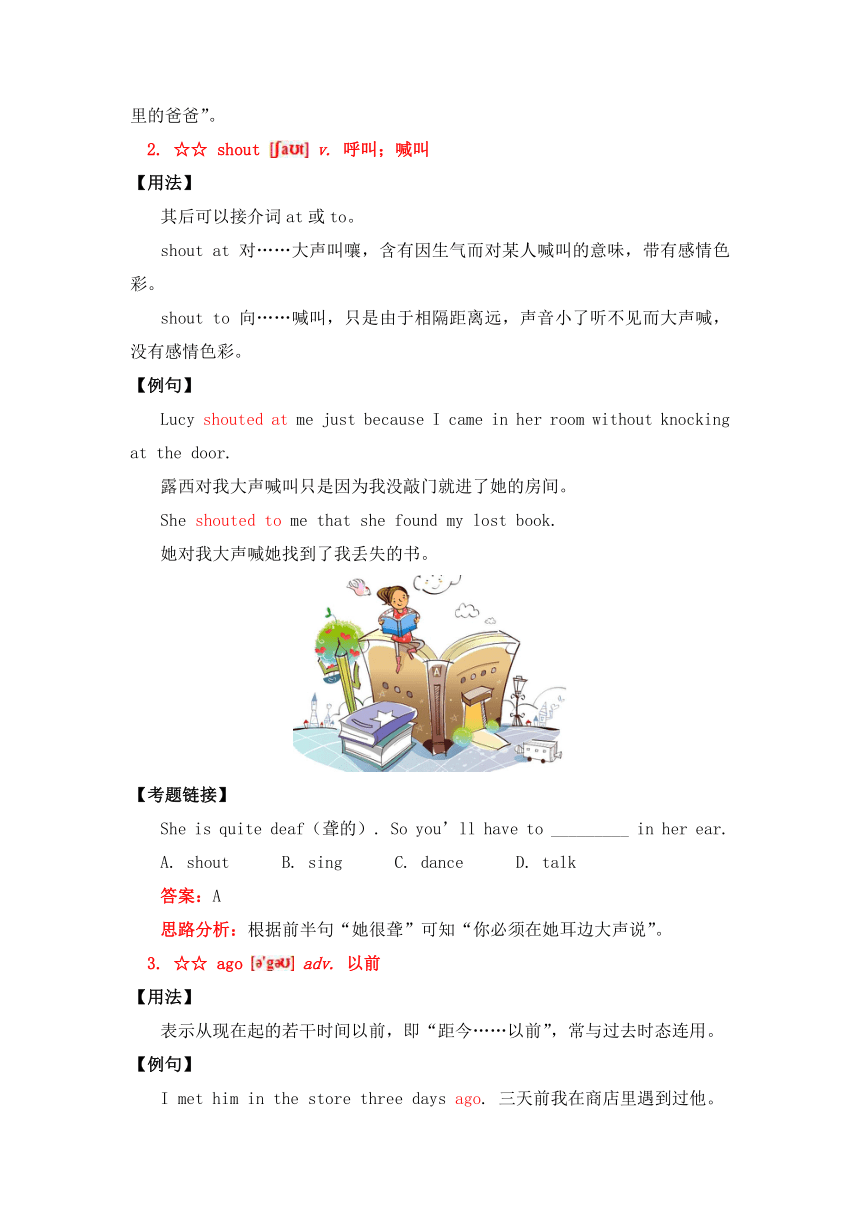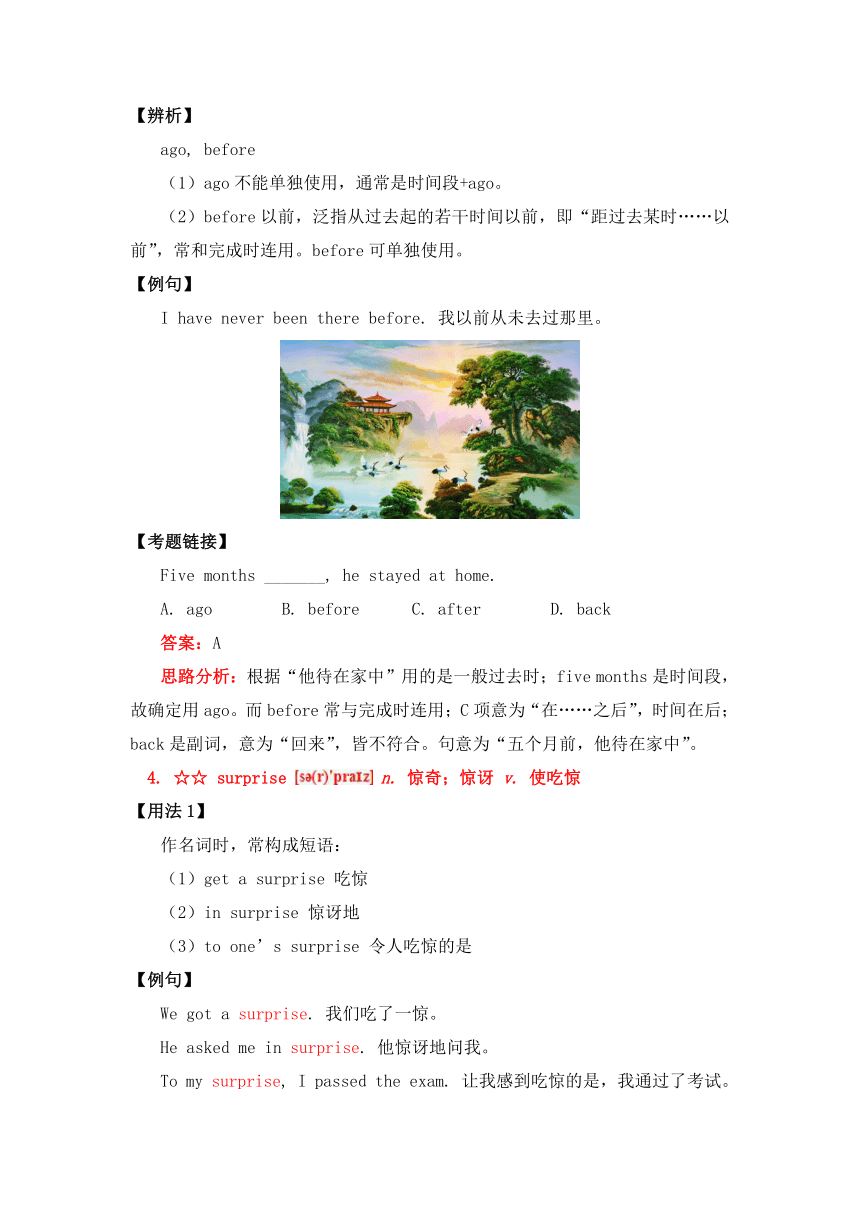英语七年级上册Unit 4 What did you do last weekend-导学案-鲁教版(五四学制)
文档属性
| 名称 | 英语七年级上册Unit 4 What did you do last weekend-导学案-鲁教版(五四学制) |

|
|
| 格式 | doc | ||
| 文件大小 | 1.8MB | ||
| 资源类型 | 教案 | ||
| 版本资源 | 鲁教版 | ||
| 科目 | 英语 | ||
| 更新时间 | 2020-09-30 00:00:00 | ||
图片预览





文档简介
年 级 七年级 学 科 英语 版 本 鲁教版(五四学制)
课程标题 Unit 4 What did you do last weekend?
一、学习目标
1. 谈论上周末做过的事情,掌握句型:
—What did you do last weekend?
—I did my homework. / We went boating.
—Where did she go last weekend?
—She went to the farm.
2. 能运用一般过去时态谈论过去的事情。
二、重点、难点
重点:
1. 单词:visitor, shout, ago, surprise, move
2. 短语:stay up, run away, wake…up, make sb./ sth. do sth.
3. 句型:
1)Well, son, that’s why it’s important to learn a second language.
2)There we put up our tents and made a fire to keep us warm and cook food on.
难点:
一般过去时态的运用。
知识梳理:
知识梳理:
一、单词领读
surprise n. 惊奇;惊讶 v. 使吃惊 visitor n. 游客;访问者
shout v. 呼叫;喊叫 ago adv. 以前
move v. 移动
二、重点单词
【单词学习】
1. ☆☆ visitor n. 游客;访问者
【用法】
(1)visit v. 拜访;访问
(2)visit v. 参观;游览
(3)visit n. 拜访;参观
【例句】
There are many visitors visiting the mountain. 有许多游客游览这山脉。
I visited my friends last weekend. 我上周末看望了我的朋友。
Now we’re on a visit to Guilin. 现在我们正在桂林参观。
【考题链接】
He often __________ his father in the country during the vacation.
A. visit B. visits C. visitor D. visited
答案:B
思路分析:根据题干中的often可知用一般现在时;D项表示一般过去时态,排除;C项意为“游客”,是名词,排除;再根据主语he是第三人称单数,故谓语动词用第三人称单数形式,排除A项。句意为“他经常在假期期间看望在乡村里的爸爸”。
2. ☆☆ shout v. 呼叫;喊叫
【用法】
其后可以接介词at或to。
shout at 对……大声叫嚷,含有因生气而对某人喊叫的意味,带有感彩。
shout to 向……喊叫,只是由于相隔距离远,声音小了听不见而大声喊,没有感彩。
【例句】
Lucy shouted at me just because I came in her room without knocking at the door.
露西对我大声喊叫只是因为我没敲门就进了她的房间。
She shouted to me that she found my lost book.
她对我大声喊她找到了我丢失的书。
【考题链接】
She is quite deaf(聋的). So you’ll have to _________ in her ear.
A. shout B. sing C. dance D. talk
答案:A
思路分析:根据前半句“她很聋”可知“你必须在她耳边大声说”。
3. ☆☆ ago adv. 以前
【用法】
表示从现在起的若干时间以前,即“距今……以前”,常与过去时态连用。
【例句】
I met him in the store three days ago. 三天前我在商店里遇到过他。
【辨析】
ago, before
(1)ago不能单独使用,通常是时间段+ago。
(2)before以前,泛指从过去起的若干时间以前,即“距过去某时……以前”,常和完成时连用。before可单独使用。
【例句】
I have never been there before. 我以前从未去过那里。
【考题链接】
Five months _______, he stayed at home.
A. ago B. before C. after D. back
答案:A
思路分析:根据“他待在家中”用的是一般过去时;five months是时间段,故确定用ago。而before常与完成时连用;C项意为“在……之后”,时间在后;back是副词,意为“回来”,皆不符合。句意为“五个月前,他待在家中”。
4. ☆☆ surprise n. 惊奇;惊讶 v. 使吃惊
【用法1】
作名词时,常构成短语:
(1)get a surprise 吃惊
(2)in surprise 惊讶地
(3)to one’s surprise 令人吃惊的是
【例句】
We got a surprise. 我们吃了一惊。
He asked me in surprise. 他惊讶地问我。
To my surprise, I passed the exam. 让我感到吃惊的是,我通过了考试。
【用法2】
作动词时,过去式是surprised。
【例句】
What I said surprised all of them. 我的话让他们都很惊讶。
【拓展】
surprised adj. 对……感到惊奇,主语是表示人的词。
surprising adj. 使人惊奇的,作定语时,修饰表物的词,作表语时,主语是表物的词。
【例句】
He is surprised at the news. 他对这则消息感到惊讶。
What a surprising result it is! 多么让人吃惊的结果!
【考题链接】
The story _______me. That is, I’m ________ at the ________ story.
A. surprise; surprising; surprised B. surprises; surprised; surprised
C. surprise; surprised; surprising D. surprises; surprised; surprising
答案:D
思路分析:the story是单数,故动词用第三人称单数形式,排除A,C两项;人对……感到惊奇,用形容词surprised;句末的story是表物的名词,故用surprising修饰。
5. ☆move v. 移动
【用法】
(1)move to +地点名词 移到……地方
(2)move from +地点名词+ to +地点名词 从……移到……
(3)move +(表地点的)副词
【例句】
He is going to move to New York. 他要搬到纽约。
【拓展】
(1)move v. 行进
(2)move v. 使感动
【例句】
The earth moves around the sun. 地球绕着太阳转。
The movie moved us. 这部电影感动了我们。
【考题链接】
Where are you going to __________?
A. move B. moved C. move to D. moved to
答案:A
思路分析:浏览题干可知Where是地点疑问副词,故move后不再接to;题干中的to后接动词原形,故选A项。句意为“你打算搬到哪儿去?”
【即学即练】
Ⅰ. 单项选择
1. Don’t shout ______ her. She is only a child.
A. to B. at C. on D. with
2. The teacher told us that the moon ________ around the earth.
A. moves B. move C. moved D. will move
3. What he said was very _______.
A. surprise B. surprised C. surprising D. surprises
答案:1. B 2. A 3. C
思路分析:
1. 因为“她只是个孩子”,所以“不要对她大喊”,带有感彩,故选B项。
2. “月亮绕着地球转”是客观事实,故用一般现在时。
3. 修饰“他说的事情”,用surprising。
Ⅱ. 根据汉语意思完成下列句子
许多游客每年都来我们村参观。
Many ______ come to _____ our village every year.
答案:visitors; visit
三、重点短语
【短语学习】
1. ☆☆ stay up 深夜不睡;熬夜
【用法】
stay up是动词+副词结构,作不及物动词短语。
【例句】
It’s bad to stay up. 熬夜是不好的。
【拓展】
(1)stay v. 停留;待
(2)stay v. 保持,用于系表结构,后接形容词,表示处于什么状态。
【例句】
They are staying in Beijing for two days. 他们要在北京待两天。
The window stayed open all the night. 这扇窗户整夜开着。
【辨析】
stay, live
(1)stay意为“停留;留下”,强调短暂停留。
(2)live意为“居住”,指长期居住。
【例句】
I often stay at school on weekdays. 我平日常待在学校。
He is from America and lives in Beijing. 他来自美国,住在北京。
【考题链接】
—Mike! Don’t ________too late. You need enough sleep.
—OK! I’ll go to bed as soon as I finish my homework.
A. put up B. stay up C. stand up D. get up
答案:B
思路分析:本题重在考查短语的差别。A项意为“举起;搭起”;B项意为“熬夜”;C项意为“起立”;D项意为“起床”。根据句意“—迈克,不要熬夜。你需要足够的睡眠。—好吧!我一做完作业就上床睡觉。”故用stay up。
2. ☆☆ run away 跑开
【用法】常用的有关away的短语:
(1)put away 把……放好;收好
(2)take away 拿走
(3)go away 走开
【例句】
The policemen caught the thief, but he ran away on the way to the police station.
警察抓住了那个小偷,但是在去警察局的途中他跑掉了。
When you finish your homework, you should put away your books.
当你做完作业,应当把书收好。
He took away my bag by mistake. 他错拿了我的书包。
When he saw his father, he went away. 他看到他爸爸就走开了。
【考题链接】
We don’t like the ice cream. Please ________ it away.
A. put B. take C. run D. go
答案:B
思路分析:根据句意“我们不喜欢这冰激凌。”可判断“请把它拿走”。C,D两项不合适,run away和go away相当于不及物动词,其后不带宾语。put away意为“把……放好;收好”。
3. ☆☆ wake…up 把……弄醒
【用法】
up是副词,代词作宾语时要放在wake和up之间。
【例句】
His mother woke him up yesterday morning. 昨天早上他妈妈把他叫醒了。
【拓展】
(1)wake up 醒来
(2)wake v. 弄醒;醒,其过去式为:woke。反义词是sleep。
(3)awake adj. 醒着的,在句中常用在系动词后作表语,反义词是asleep,意为“睡着的”。
【例句】
I wake up early every morning. 每天早晨我都醒得很早。
It was 11 o’clock, but she was still awake. 十一点了,可她还是睡不着。
【考题链接】
The baby is sleeping. Don’t _______.
A. wake up him B. wake him up C. to wake up him D. to wake him up
答案:B
思路分析:Don’t后接动词原形,故排除C,D两项;him是代词,故要放在wake和up之间。句意为“这婴儿正在睡觉,不要吵醒他”。
4. ☆☆ make sb./ sth. do sth. 使某人/某物做某事
【例句】
The news made my father feel sad. 这个消息使我爸爸感到伤心。
【考题链接】
Who made the baby _____?
A. crying B. to cry C. cried D. cry
答案:D
思路分析:make sb. do sth. 意为“使某人做某事”,故用动词原形cry。句意为“谁把这婴儿弄哭了?”
【即学即练】
单项选择
1. Sometimes I ________ in the big hotel.
A. stay B. live C. stays D. lives
2. —Why do you look so tired?
—I was ________ all night because of the noise upstairs.
A. to wake B. awake C. waking D. wakes
3. He _______ from home when he was sixteen.
A. put away B. take away C. ran away D. got away
4. The teacher ______ us _______ these exercises.
A. make; do B. made; do C. makes; done D. making; done
答案:1. A 2. B 3. C 4. B
思路分析:
1. 根据“在大旅馆里”可知是短暂的停留,故排除B和D两项;主语是I,故选A项。
2. be awake意为“醒着”,答句的句意为“因为楼上的噪音,我整夜都醒着”。
3. 句意为“他16岁的时候就离家了”。
4. 句意为 “老师让我们做这些练习”。考查make sb. do sth.。
四、重点句型
【句型学习】
1. Well, son, that’s why it’s important to learn a second language.
哦,儿子,这就是为什么学习一门外语是重要的啦。
【句析】
本句是含有表语从句的复合句。why it’s important to learn a second language作is的表语。
【例句】
This is why I’m late. 这就是我迟到的原因。
【考点】
在it’s important to learn a second language中,it是形式主语,真正的主语是动词不定式。
It is/ was + adj. +(for sb.)+ to do sth.(对某人来说)做某事是怎样的。
【例句】
It’s good for me to eat healthy food. 对我来说,吃健康的食物是有益的。
【考题链接】
翻译:
(1)那就是我早来的原因。
That’s ________ I came here ________.
(2)学好英语对我弟弟来说不容易。
It’s not _______ _______ my brother _______ ________ English well.
答案:(1)why; early (2)easy for; to learn
2. There we put up our tents and made a fire to keep us warm and cook food on.
在那里我们搭起我们的帐篷,点上篝火来取暖并在上面做饭。
【句析】
本句的主体部分是we put up our tents and made a fire, to keep us warm and cook food on是made a fire的目的。介词on后省略了it,避免重复。
【考点】
to keep us warm and cook food on 是目的状语。从逻辑上,a fire 作了介词on的宾语。即:(to)cook food on a fire,“to do sth. +介词+名词”结构,其中的名词在句中为动词的宾语时,句尾的介词不可省略。
【例句】
Mary has no friends to play games with. 玛丽没有朋友和她玩游戏。
【考题链接】
She needs some paper to _________.
A. write B. write to C. write with D. write on
答案:D
思路分析:本题考查不定式作定语。不定式作定语时,与其修饰的名词在逻辑上存在动宾关系,如果动词为不及物动词,需要加上一个适当的介词。“在纸上写”应用介词on。
【即学即练】
根据汉语意思完成下列句子
1. 保持身体健康很重要。
It’s important ________ ________ healthy.
2. 这就是我想说的。
This is _______ I want to ________.
答案:1. to keep/stay 2. what; say
课程标题 Unit 4 What did you do last weekend?
一、学习目标
1. 谈论上周末做过的事情,掌握句型:
—What did you do last weekend?
—I did my homework. / We went boating.
—Where did she go last weekend?
—She went to the farm.
2. 能运用一般过去时态谈论过去的事情。
二、重点、难点
重点:
1. 单词:visitor, shout, ago, surprise, move
2. 短语:stay up, run away, wake…up, make sb./ sth. do sth.
3. 句型:
1)Well, son, that’s why it’s important to learn a second language.
2)There we put up our tents and made a fire to keep us warm and cook food on.
难点:
一般过去时态的运用。
知识梳理:
知识梳理:
一、单词领读
surprise n. 惊奇;惊讶 v. 使吃惊 visitor n. 游客;访问者
shout v. 呼叫;喊叫 ago adv. 以前
move v. 移动
二、重点单词
【单词学习】
1. ☆☆ visitor n. 游客;访问者
【用法】
(1)visit v. 拜访;访问
(2)visit v. 参观;游览
(3)visit n. 拜访;参观
【例句】
There are many visitors visiting the mountain. 有许多游客游览这山脉。
I visited my friends last weekend. 我上周末看望了我的朋友。
Now we’re on a visit to Guilin. 现在我们正在桂林参观。
【考题链接】
He often __________ his father in the country during the vacation.
A. visit B. visits C. visitor D. visited
答案:B
思路分析:根据题干中的often可知用一般现在时;D项表示一般过去时态,排除;C项意为“游客”,是名词,排除;再根据主语he是第三人称单数,故谓语动词用第三人称单数形式,排除A项。句意为“他经常在假期期间看望在乡村里的爸爸”。
2. ☆☆ shout v. 呼叫;喊叫
【用法】
其后可以接介词at或to。
shout at 对……大声叫嚷,含有因生气而对某人喊叫的意味,带有感彩。
shout to 向……喊叫,只是由于相隔距离远,声音小了听不见而大声喊,没有感彩。
【例句】
Lucy shouted at me just because I came in her room without knocking at the door.
露西对我大声喊叫只是因为我没敲门就进了她的房间。
She shouted to me that she found my lost book.
她对我大声喊她找到了我丢失的书。
【考题链接】
She is quite deaf(聋的). So you’ll have to _________ in her ear.
A. shout B. sing C. dance D. talk
答案:A
思路分析:根据前半句“她很聋”可知“你必须在她耳边大声说”。
3. ☆☆ ago adv. 以前
【用法】
表示从现在起的若干时间以前,即“距今……以前”,常与过去时态连用。
【例句】
I met him in the store three days ago. 三天前我在商店里遇到过他。
【辨析】
ago, before
(1)ago不能单独使用,通常是时间段+ago。
(2)before以前,泛指从过去起的若干时间以前,即“距过去某时……以前”,常和完成时连用。before可单独使用。
【例句】
I have never been there before. 我以前从未去过那里。
【考题链接】
Five months _______, he stayed at home.
A. ago B. before C. after D. back
答案:A
思路分析:根据“他待在家中”用的是一般过去时;five months是时间段,故确定用ago。而before常与完成时连用;C项意为“在……之后”,时间在后;back是副词,意为“回来”,皆不符合。句意为“五个月前,他待在家中”。
4. ☆☆ surprise n. 惊奇;惊讶 v. 使吃惊
【用法1】
作名词时,常构成短语:
(1)get a surprise 吃惊
(2)in surprise 惊讶地
(3)to one’s surprise 令人吃惊的是
【例句】
We got a surprise. 我们吃了一惊。
He asked me in surprise. 他惊讶地问我。
To my surprise, I passed the exam. 让我感到吃惊的是,我通过了考试。
【用法2】
作动词时,过去式是surprised。
【例句】
What I said surprised all of them. 我的话让他们都很惊讶。
【拓展】
surprised adj. 对……感到惊奇,主语是表示人的词。
surprising adj. 使人惊奇的,作定语时,修饰表物的词,作表语时,主语是表物的词。
【例句】
He is surprised at the news. 他对这则消息感到惊讶。
What a surprising result it is! 多么让人吃惊的结果!
【考题链接】
The story _______me. That is, I’m ________ at the ________ story.
A. surprise; surprising; surprised B. surprises; surprised; surprised
C. surprise; surprised; surprising D. surprises; surprised; surprising
答案:D
思路分析:the story是单数,故动词用第三人称单数形式,排除A,C两项;人对……感到惊奇,用形容词surprised;句末的story是表物的名词,故用surprising修饰。
5. ☆move v. 移动
【用法】
(1)move to +地点名词 移到……地方
(2)move from +地点名词+ to +地点名词 从……移到……
(3)move +(表地点的)副词
【例句】
He is going to move to New York. 他要搬到纽约。
【拓展】
(1)move v. 行进
(2)move v. 使感动
【例句】
The earth moves around the sun. 地球绕着太阳转。
The movie moved us. 这部电影感动了我们。
【考题链接】
Where are you going to __________?
A. move B. moved C. move to D. moved to
答案:A
思路分析:浏览题干可知Where是地点疑问副词,故move后不再接to;题干中的to后接动词原形,故选A项。句意为“你打算搬到哪儿去?”
【即学即练】
Ⅰ. 单项选择
1. Don’t shout ______ her. She is only a child.
A. to B. at C. on D. with
2. The teacher told us that the moon ________ around the earth.
A. moves B. move C. moved D. will move
3. What he said was very _______.
A. surprise B. surprised C. surprising D. surprises
答案:1. B 2. A 3. C
思路分析:
1. 因为“她只是个孩子”,所以“不要对她大喊”,带有感彩,故选B项。
2. “月亮绕着地球转”是客观事实,故用一般现在时。
3. 修饰“他说的事情”,用surprising。
Ⅱ. 根据汉语意思完成下列句子
许多游客每年都来我们村参观。
Many ______ come to _____ our village every year.
答案:visitors; visit
三、重点短语
【短语学习】
1. ☆☆ stay up 深夜不睡;熬夜
【用法】
stay up是动词+副词结构,作不及物动词短语。
【例句】
It’s bad to stay up. 熬夜是不好的。
【拓展】
(1)stay v. 停留;待
(2)stay v. 保持,用于系表结构,后接形容词,表示处于什么状态。
【例句】
They are staying in Beijing for two days. 他们要在北京待两天。
The window stayed open all the night. 这扇窗户整夜开着。
【辨析】
stay, live
(1)stay意为“停留;留下”,强调短暂停留。
(2)live意为“居住”,指长期居住。
【例句】
I often stay at school on weekdays. 我平日常待在学校。
He is from America and lives in Beijing. 他来自美国,住在北京。
【考题链接】
—Mike! Don’t ________too late. You need enough sleep.
—OK! I’ll go to bed as soon as I finish my homework.
A. put up B. stay up C. stand up D. get up
答案:B
思路分析:本题重在考查短语的差别。A项意为“举起;搭起”;B项意为“熬夜”;C项意为“起立”;D项意为“起床”。根据句意“—迈克,不要熬夜。你需要足够的睡眠。—好吧!我一做完作业就上床睡觉。”故用stay up。
2. ☆☆ run away 跑开
【用法】常用的有关away的短语:
(1)put away 把……放好;收好
(2)take away 拿走
(3)go away 走开
【例句】
The policemen caught the thief, but he ran away on the way to the police station.
警察抓住了那个小偷,但是在去警察局的途中他跑掉了。
When you finish your homework, you should put away your books.
当你做完作业,应当把书收好。
He took away my bag by mistake. 他错拿了我的书包。
When he saw his father, he went away. 他看到他爸爸就走开了。
【考题链接】
We don’t like the ice cream. Please ________ it away.
A. put B. take C. run D. go
答案:B
思路分析:根据句意“我们不喜欢这冰激凌。”可判断“请把它拿走”。C,D两项不合适,run away和go away相当于不及物动词,其后不带宾语。put away意为“把……放好;收好”。
3. ☆☆ wake…up 把……弄醒
【用法】
up是副词,代词作宾语时要放在wake和up之间。
【例句】
His mother woke him up yesterday morning. 昨天早上他妈妈把他叫醒了。
【拓展】
(1)wake up 醒来
(2)wake v. 弄醒;醒,其过去式为:woke。反义词是sleep。
(3)awake adj. 醒着的,在句中常用在系动词后作表语,反义词是asleep,意为“睡着的”。
【例句】
I wake up early every morning. 每天早晨我都醒得很早。
It was 11 o’clock, but she was still awake. 十一点了,可她还是睡不着。
【考题链接】
The baby is sleeping. Don’t _______.
A. wake up him B. wake him up C. to wake up him D. to wake him up
答案:B
思路分析:Don’t后接动词原形,故排除C,D两项;him是代词,故要放在wake和up之间。句意为“这婴儿正在睡觉,不要吵醒他”。
4. ☆☆ make sb./ sth. do sth. 使某人/某物做某事
【例句】
The news made my father feel sad. 这个消息使我爸爸感到伤心。
【考题链接】
Who made the baby _____?
A. crying B. to cry C. cried D. cry
答案:D
思路分析:make sb. do sth. 意为“使某人做某事”,故用动词原形cry。句意为“谁把这婴儿弄哭了?”
【即学即练】
单项选择
1. Sometimes I ________ in the big hotel.
A. stay B. live C. stays D. lives
2. —Why do you look so tired?
—I was ________ all night because of the noise upstairs.
A. to wake B. awake C. waking D. wakes
3. He _______ from home when he was sixteen.
A. put away B. take away C. ran away D. got away
4. The teacher ______ us _______ these exercises.
A. make; do B. made; do C. makes; done D. making; done
答案:1. A 2. B 3. C 4. B
思路分析:
1. 根据“在大旅馆里”可知是短暂的停留,故排除B和D两项;主语是I,故选A项。
2. be awake意为“醒着”,答句的句意为“因为楼上的噪音,我整夜都醒着”。
3. 句意为“他16岁的时候就离家了”。
4. 句意为 “老师让我们做这些练习”。考查make sb. do sth.。
四、重点句型
【句型学习】
1. Well, son, that’s why it’s important to learn a second language.
哦,儿子,这就是为什么学习一门外语是重要的啦。
【句析】
本句是含有表语从句的复合句。why it’s important to learn a second language作is的表语。
【例句】
This is why I’m late. 这就是我迟到的原因。
【考点】
在it’s important to learn a second language中,it是形式主语,真正的主语是动词不定式。
It is/ was + adj. +(for sb.)+ to do sth.(对某人来说)做某事是怎样的。
【例句】
It’s good for me to eat healthy food. 对我来说,吃健康的食物是有益的。
【考题链接】
翻译:
(1)那就是我早来的原因。
That’s ________ I came here ________.
(2)学好英语对我弟弟来说不容易。
It’s not _______ _______ my brother _______ ________ English well.
答案:(1)why; early (2)easy for; to learn
2. There we put up our tents and made a fire to keep us warm and cook food on.
在那里我们搭起我们的帐篷,点上篝火来取暖并在上面做饭。
【句析】
本句的主体部分是we put up our tents and made a fire, to keep us warm and cook food on是made a fire的目的。介词on后省略了it,避免重复。
【考点】
to keep us warm and cook food on 是目的状语。从逻辑上,a fire 作了介词on的宾语。即:(to)cook food on a fire,“to do sth. +介词+名词”结构,其中的名词在句中为动词的宾语时,句尾的介词不可省略。
【例句】
Mary has no friends to play games with. 玛丽没有朋友和她玩游戏。
【考题链接】
She needs some paper to _________.
A. write B. write to C. write with D. write on
答案:D
思路分析:本题考查不定式作定语。不定式作定语时,与其修饰的名词在逻辑上存在动宾关系,如果动词为不及物动词,需要加上一个适当的介词。“在纸上写”应用介词on。
【即学即练】
根据汉语意思完成下列句子
1. 保持身体健康很重要。
It’s important ________ ________ healthy.
2. 这就是我想说的。
This is _______ I want to ________.
答案:1. to keep/stay 2. what; say
同课章节目录
- Unit 1 What does he look like?
- Section A
- Section B
- Unit 2 I'd like some noodles.
- Section A
- Section B
- Unit 3 How was your school trip?
- Section A
- Section B
- Unit 4 What did you do last weekend?
- Section A
- Section B
- Unit 5 Where did you go on vacation?
- Section A
- Section B
- Unit 6 How often do you exercise?
- Section A
- Section B
- Unit 7 I'm more outgoing than my sister.
- Section A
- Section B
- Unit 8 What's the best movie theater?
- Section A
- Section B
